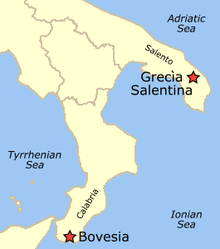| Calabrian Greek | |
|---|---|
| Γκραίκο | |
| Native to | Italy |
| Region | Calabria |
| Ethnicity | Greeks |
Native speakers | c. 2,000 (2010)[1] |
| Latin | |
| Official status | |
Recognised minority language in | Italy
|
| Language codes | |
| ISO 639-3 | – |
| Glottolog | aspr1238 Aspromonte |
| Linguasphere | 56-AAA-aib |
| IETF | el-Latn-u-sd-it78 |
 Location map of the Italiot-speaking areas Grecìa Salentina and Bovesia | |
Calabrian Greek (endonym: Greko/ Γκραίκο; Italian: Grecanico[2]) is the variety of Italiot Greek used by the ethnic Griko people in Calabria, as opposed to the Italiot Greek dialect spoken in the Grecìa Salentina. Both are remnants of the Ancient and Byzantine Greek colonization of the region.
Calabrian Greek is mentioned in the Red Book of UNESCO on endangered languages,[3] together with Griko. In addition, Euromosaic analyses[4] and recognizes it as being an endangered and minority language in the European Union. It is mentioned by Ethnologue as a dialect of Modern Greek[5] in the sense of a modern vernacular language of the Hellenic family (as is the case with Pontic and Tsakonian Greek).
- ^ Tom Mueller, Calabria Grecanica Archived 2 April 2015 at the Wayback Machine, article at madeinsouthitaly.com. Retrieved 31 March 2015: "In the last 30 years alone, five Greek-speaking villages have been abandoned. Though no one knows exactly how many native speakers remain, they cannot number much above 2,000."
- ^ In Salento e Calabria le voci della minoranza linguistica greca Archived 9 July 2017 at the Wayback Machine. F. Violi, Lessico Grecanico-Italiano-Grecanico, Apodiafàzzi, Reggio Calabria, 1997. Paolo Martino, L'isola grecanica dell'Aspromonte. Aspetti sociolinguistici, 1980. Risultati di un'inchiesta del 1977 Filippo Violi, Storia degli studi e della letteratura popolare grecanica, C.S.E. Bova (RC), 1992. Filippo Condemi, Grammatica Grecanica, Coop. Contezza, Reggio Calabria, 1987. Macrì, Gabriella (2016). "Aspetti intertestuali tra letteratura grecanica di Calabria e letteratura grecaa". Linguarum Varietas (5): 121–132. doi:10.1400/243852. Archived from the original on 15 December 2019. Retrieved 15 December 2019. "Il greco nell'Italia meridionale: Italo-greco" (PDF). Archived (PDF) from the original on 15 December 2019. Retrieved 15 December 2019. Pipyrou, Stavroula (September 2010). "Grecanici ethnicisation: power and knowledge at work". Anthropology Reviews: Dissent and Cultural Politics. 2. Archived from the original on 15 December 2019. Retrieved 15 December 2019. Pipyrou, Stavroula (2012). "Commensurable language and incommensurable claims among the Greek linguistic minority of Southern Italy". Journal of Modern Italian Studies. 17: 70–91. doi:10.1080/1354571X.2012.628104. S2CID 144311173."TRATTI LINGUISTICI IN COMUNE NEI DIALETTI ITALOGRECI E ITALIANI DELL'ITALIA MERIDIONALE CON PARTICOLARE RIGUARDO ALL'USO DELL'INFINITO" (PDF). Archived (PDF) from the original on 3 April 2016. Retrieved 15 December 2019. "Home". www.galareagrecanica.it. Archived from the original on 15 December 2019. Retrieved 15 December 2019. Ou, Yapeng; Bevilacqua, Carmelina (8 June 2018). "From Territorial Identity to Territorial Branding: Tourism-led Revitalization of Minor Historic Towns in Reggio Calabria" – via ResearchGate. Rognoni, Cristina (2014). "Pratique juridique grecque et économie dans la Calabre post-byzantine (XIIe-XIIIe siècle)". Cahiers de Recherches Médiévales et Humanistes (28): 409–430. doi:10.4000/crm.13758. Archived from the original on 15 December 2019. Retrieved 15 December 2019. Pipyrou, Stavroula (2010). "Urbanities: Grecanici Migration to the City of Reggio Calabria, South Italy". History and Anthropology. 21: 19–36. doi:10.1080/02757201003647141. S2CID 144996934. "L'isola grecanica dell'Aspromonte. Aspetti sociolinguistici" (PDF). Archived (PDF) from the original on 31 October 2017. Retrieved 15 December 2019. Pipyrou, Stavroula (2014). "Colonialism and "Southernisation". The case of Grecanici in Calabria". Etnografia e Ricerca Qualitativa (2/2014): 245–264. doi:10.3240/77330. "Rischio desertificazione nei comprensori comunali dell'Area Grecanica (Calabria)" (PDF). Archived (PDF) from the original on 15 December 2019. Retrieved 15 December 2019. Rohlfs, G. (1978). "Calabria Dialettale Tra Monte Pollino e Aspromonte (Calabria Latina e Calabria Grecanica)". Forum Italicum: A Journal of Italian Studies. 12: 3–10. doi:10.1177/001458587801200101. S2CID 164146642. Pipyrou, Stavroula (28 July 2016). The Grecanici of Southern Italy: Governance, Violence, and Minority Politics. University of Pennsylvania Press. ISBN 9780812292985. Morazzoni, Monica; Zavettieri, Giovanna Giulia (2019). "I grecanici dell'Aspromonte: identità culturale, tradizioni e turismo". Geography Notebooks. 2 (1). doi:10.7358/gn-2019-001-mora. hdl:2108/287178. S2CID 199314828. Modaffari, Giovanni (2019). "PER UNA GEOGRAFIA DELL'AREA GRECANICA: ABBANDONO, SDOPPIAMENTO E MUSEALIZZAZIONE DEI CENTRI INTERNI". Documenti Geografici (2): 33–51. doi:10.19246/DOCUGEO2281-7549/201802_03. Archived from the original on 15 December 2019. Retrieved 15 December 2019. Artuso, R. 1999. Roghudi e Ghorio, Una fetta di mondo grecanico. Roghudi (RC): Comune di Roghudi. Crupi, P. 1982. Roghudi, Un’isola grecanica asportata. Cosenza: Pellegrini Editore. Martino, P. 1980. “L’isola grecanica dell’Aspromonte. Aspetti sociolinguistici”. Atti dell’XI Congresso Internazionale di Studi (Cagliari 27–30 maggio 1977), a cura di F. A. Leoni, 305–341. Roma: Bulzoni. Martino, P. 1979. L’isola grecanica dell’Aspromonte. Aspetti sociolinguistici. In Albano Leoni, F. (ed.). 1979. I Dialetti e le Lingue delle Minoranze di Fronte all’Italiano. Roma: Bulzoni. Violi, F. 1992. Storia degli studi e della letteratura popolare grecanica, Bova (RC): C.S.E.[excessive citations]
- ^ "Endangered languages in Europe: report". helsinki.fi. Archived from the original on 24 February 2019. Retrieved 23 April 2018.
- ^ "Euromosaic – Greek (Griko) in Italy". uoc.edu. Archived from the original on 15 January 2018. Retrieved 23 April 2018.
- ^ "Greek". ethnologue.com. Archived from the original on 28 May 2010. Retrieved 23 April 2018.